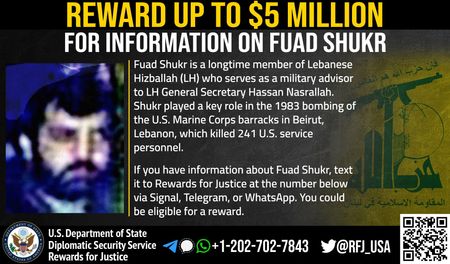BEIRUT (Reuters) – Fuad Shukr, a Hezbollah commander whom Israel believes it killed in an airstrike in Beirut on Tuesday, has been one of the group’s leading military figures since it was established by Iran’s Revolutionary Guards more than four decades ago.
Part of the generation of Lebanese Shi’ites who founded Hezbollah during the Israeli invasion of Lebanon in 1982, Shukr was a friend of the group’s late military commander Imad Mughniyeh, who was assassinated in Damascus in 2008, Hezbollah sources said.
The United States says Shukr, believed to be in his 60s, played a central role in the 1983 bombing of the U.S. Marine barracks in Beirut, which killed 241 U.S. military personnel, and had put a bounty of up to $5 million on his head, according to the U.S. government’s Rewards for Justice website.
He was hit in what the Israeli army has said was a targeted strike against the Hezbollah commander responsible for an attack in the Israeli-occupied Golan Heights that killed 12 children and teenagers at the weekend. Hezbollah denied any role.
An Israel broadcast report said the commander was killed.
Two security sources in Lebanon earlier named the target as Shukr, describing him as head of Hezbollah’s operations centre. They said he was critically injured in the attack around Hezbollah’s Shura Council in the Haret Hreik neighbourhood.
Also known as Al-Hajj Mohsin, Hezbollah sources said Shukr is a special adviser to Hezbollah leader Sayyed Hassan Nasrallah and a member of the Shura Council, a decision-making body.
The sources said he became more prominent in Hezbollah after the assassination of Mughniyeh – a shadowy figure remembered in Hezbollah as a military mastermind who was on the U.S. list of most wanted terrorists, accused of plotting attacks on Western interests including the Marines barracks.
Referring to those attacks and hostage-taking in Lebanon in the 1980s, Hezbollah leader Nasrallah said in a 2022 interview with an Arabic broadcaster they were carried out by small groups not linked to Hezbollah.
The Hezbollah sources said Shukr fought Israeli troops during Israel’s 1982 invasion alongside both Mughniyeh and Mustafa Badreddine, another of Hezbollah’s veteran commanders who was killed in Syria in 2016.
Announcing the bounty on his head in 2017, the U.S. Rewards for Justice program said he was a senior Hezbollah military commander of the group’s forces in southern Lebanon and a member of Hezbollah’s highest military body, the Jihad Council.
It also said he played a key role in its military operations in Syria, where Hezbollah deployed fighters in support of President Bashar al-Assad in the early years of the Syrian civil war.
Hezbollah at the time dismissed the accusations against Shukr and another Hezbollah operative for whom a bounty was offered, Talal Hamiyah, saying they were “rejected and void”.
(Writing by Tom Perry; Editing by Cynthia Osterman)











